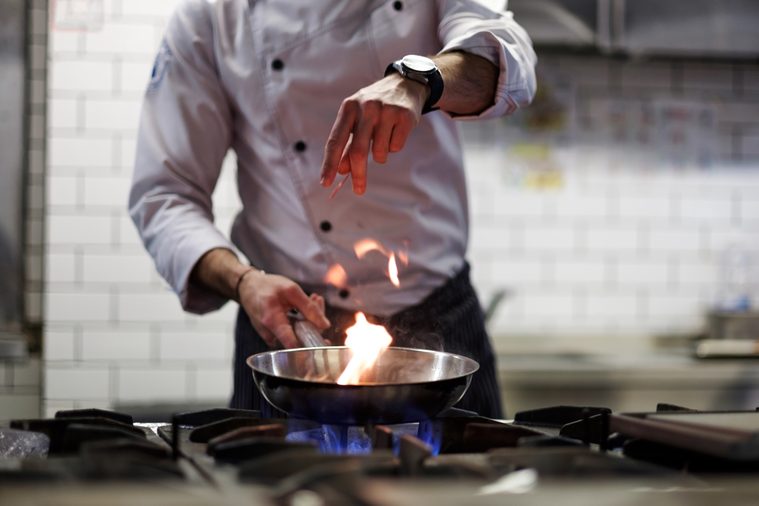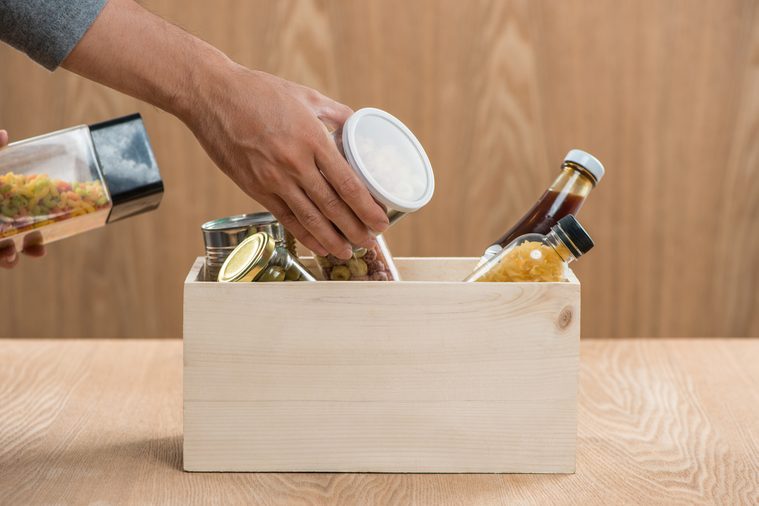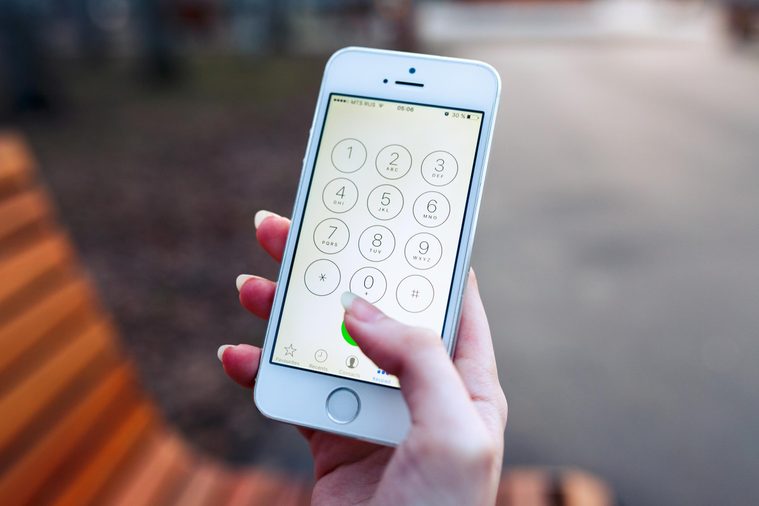
Meet more people
Every new connection can lead to an opportunity personally or professionally, and you improve your odds of knowing the right person by meeting more people. So expand your social circle. Build your professional network. Janice Kaplan, the author of How Luck Happens, points out that it’s not always the people you expect who can make luck for you. “The real power comes from the strength of ‘weak ties,'” she says. “Your parents and friends already know the same people and opportunities that you do. But it’s that next circle—the people you only see from time to time—who can often introduce you to new possibilities.”
Research suggests that social relationships are critical to happiness and well-being, says Sonja Lyubomirsky, PhD, professor and vice chair of psychology at the University of California Riverside and author of The How of Happiness. “Connecting with others—whether this means making meaningful eye contact with a grocery store clerk, bonding over a favorite song with a colleague or discussing your dreams with your partner (in an authentic way)—is how we build and strengthen relationships,” she says. “That’s how we maintain and increase our happiness.” Check out true stories that will change how you think about luck.

Be flexible
You might have plans to be married by a certain age, kids by another, and to hit certain career goals. But luck doesn’t care about your plans. It follows its own path. So, be willing to adapt your plans if a new opportunity presents itself. “If you aren’t flexible with your goals, then you’ll get stuck on a path that may not be the right fit for you,” says Dr. Lyubomirsky. She says maybe you’ve realized you don’t have the talent it takes to be a doctor. Or you do have the passion it takes to be a chef. The more flexible you are to step outside your comfort zone, the more likely you are to catch a lucky break.
“It’s only when the unexpected happens that we’re fully present and awake to the world around us,” says Tania Luna, a partner at LifeLabs Learning, where she specializes in leadership development for innovative companies. She is also coauthor of Surprise: Embrace the Unpredictable and Engineer the Unexpected. “We feel comfortable when things are certain, but we feel most alive when they’re not.” People who are less flexible tend to overlook opportunities by staying too focused on one path. “You want to be able to zig when others zag and go in a different direction rather than the standard path,” says Kaplan. Being willing to explore unforeseen opportunities can take us to unexpected outcomes. Sometimes it can even lead to better results in the long run.
Dr. Lyubomirsky says that research suggests that variety can help prevent us from getting comfortable. “When we’re open to opportunities that lead us to experience, novelty, and surprise, we can maintain happiness more easily,” she says. Find out what lucky people do that you don’t.

Take the initiative
You miss 100 percent of the shots you don’t take, said hockey great Wayne Gretzky. “When you take a risk and things don’t work out, you get over it,” says Luna. “When you hold back and never take the plunge, you spend your whole life with the ache of wondering what might have been.” You raise your odds of winning by just stepping up to the plate. “You want to increase your odds of something good happening—and that occurs by giving yourself as many opportunities as possible,” says Kaplan. If you don’t take chances and put yourself in a position to have something positive happen, it won’t. “If you don’t put yourself in the game, you won’t get lucky,” says Stephen Simpson, MB, MBA, a mind coach, hypnotherapist, presenter, author and Fellow of the Royal Society of Medicine. “You’ll walk away from some games with a bloody nose. But sooner or later you’ll walk away as the champion. Persistence is a critical component of luck.”

Go with your gut
Lucky people act on their intuitions. “Intuition is the most precious gift we have,” says Dr. Simpson. He says that your first thought is normally your best thought. “Intuition is destroyed by overthinking, over planning, and stressing out,” he says. “Intuition is also the foundation of attracting luck.” According to a study by Richard Wiseman in The Luck Factor, almost 90 percent of lucky people said that they trusted their intuition when it came to personal relationships. And almost 80 percent said it played a vital role in their career choices. About 20 percent more lucky than unlucky people used their intuition when it came to making important financial decisions. And over 20 percent more used their intuition when thinking about their career choices. Here’s how to better tap into your intuition for a happier life.

Turn bad luck into good luck
No one is lucky all the time; failure and setbacks happen to everyone. But lucky people handle adversity differently than the unlucky. “The number one trait for creating luck is probably optimism,” says Kaplan. Wiseman explains that lucky people see the positive side of their bad luck. They’re convinced that any ill-fortune in their lives will work out for the best in the long run. “None of us know what is good luck or bad luck,” says Dr. Simpson. “It never fails to surprise me how many people suffer terrible adversity. Yet, they say with total conviction that looking back this was the best thing that ever happened to them, and they wouldn’t change it even if they could.”

Don’t be afraid to fail
“It’s a cliché, but the most successful people have failed many times,” says Dr. Lyubomirsky. Go ahead and take a risk and chance. Ask yourself what’s the worst thing that can happen if you try something and fail—chances are, it isn’t that bad. “We learn more from failure than from success,” says Dr. Simpson. “The more times we come second in the competition, the more likely we are to win the next.” Check out more incredible true stories that prove good karma is real.

Keep an open mind
“Luck is where you find it,” says Ellen Weinstein, author and illustrator of Recipes for Good Luck: The Superstitions, Rituals, and Practices of Extraordinary People. “An opportunity can present itself at any time, but you have to be able to recognize it and be prepared to act.” Maintain an open and optimistic attitude, she says.
“An open mind enables you to live in the world of infinite possibility,” says Dr. Simpson. “Sooner or later one of these possibilities will ignite unexpected success.” Wiseman has found that lucky and unlucky people deal with misfortune differently. He asked his self-reported lucky and unlucky study participants to imagine being in a bank when an armed robber enters and fires a shot that hits them in the arm. Unlucky people tend to say it was their bad luck to be in the bank at that time. Lucky people note that it could’ve been worse. His study confirmed that lucky people use this line of thinking to ease the impact of misfortune.

Stay positive
Focusing only on the negatives dampens your future expectations and your spirits. Instead of seeing the grass as being greener on the other side, look at all the positivity happening on your side of the fence. If you only see negativity in your life, then you’ll exude negative energy. Researchers at the University of Toronto found that people in good moods take in more visual information, while those in bad moods don’t see as much around them. “Our mind is expert at transforming our thoughts into reality,” says Dr. Simpson. “Expect to fail and the chances are you will. Expect to succeed and your brain will be flooded with feel-good endorphins.” These amazing true stories will change how you think about luck.

See good luck everywhere
“We live in a world of infinite opportunity and possibility,” says Dr. Simpson. In research, Elizabeth Nutt Williams, a psychology professor at St. Mary’s College in Maryland, has found that chance was a significant factor in shaping the career paths of professional women she studied. Women who take advantage of happenstance have competence, self-confidence, and the ability to take risks. They also have a strong support system. And a North Carolina State University study found through interviews with engineering workers that job tips often come from unlikely sources in unexpected situations.

Say yes
Don’t skip that party because you won’t know anyone. If you go, you could meet new people and have a great time. “Research from my lab recently showed that people who force themselves to act more extroverted for just one week get a lot happier,” says Dr. Lyubomirsky. Don’t turn down a juicy opportunity that jumps into your path. Ignore those feelings of anxiety about what could go wrong. Instead, follow your curiosity and intrigue and seize that opportunity. “New experiences release dopamine in our brains—the neurotransmitter associated with interest, excitement, and attraction,” says Luna. “We need bursts of dopamine to keep having fun in life.” Check out the 5 strengths of being an extrovert.

Slack off occasionally
Wiseman conducted an experiment in which he gave subjects a newspaper and asked them to count how many photographs were inside. There were 43, and most subjects found them within a few minutes. However, they could’ve completed the task within seconds had they read the large type on the second page of the paper. It said, “Stop counting—there are 43 photographs in this newspaper.” Or they could’ve instead earned $250 had they noticed the half-page message that said, “Stop counting, tell the experimenter you have seen this and win $250.” The subjects didn’t notice either message. But when Wiseman asked them to look through the newspaper a second time for anything unusual, they saw them immediately. Allow yourself to stray off-task sometimes. If you pay more attention to potentially irrelevant details in your surroundings, you’ll become aware of hidden opportunities.

Put others first
Focusing on helping others achieve their goals can open new opportunities for you. As a bonus, giving reminds us how lucky we already are. Research suggests that doing acts of kindness for others makes people happier, more connected and healthier. “When you help others, you also strengthen relationships and make new friends,” says Dr. Lyubomirsky. “You increase opportunities for ‘good luck’ like meeting a new friend or business partner.” Everyone can be altruistic on a small scale, says Weinstein. “Help one person, volunteer with an organization,” says Weinstein. “It has been said that helping others puts us in a positive frame of mind. And being positive is a way to make yourself luckier.” Check out these stories about life-changing acts of kindness.

Call old friends
Think twice before turning down that 20th reunion invite. Yes, meeting new people is important. However, the most powerful relationships can be your longtime ones. Instead of only building relationships with new people, nurture old relationships, too. In one study, Wiseman showed participants a list of last names and asked them if they were on a first-name basis with at least one person with each name. Of the subjects who considered themselves lucky, half were able to tick off eight or more names. Only a quarter of the participants in the unlucky group could. Find out the 10 things optimistic people do every day.